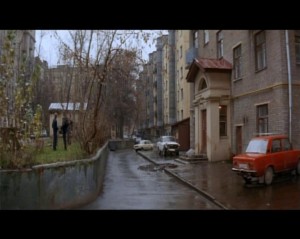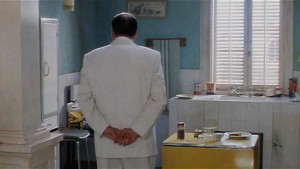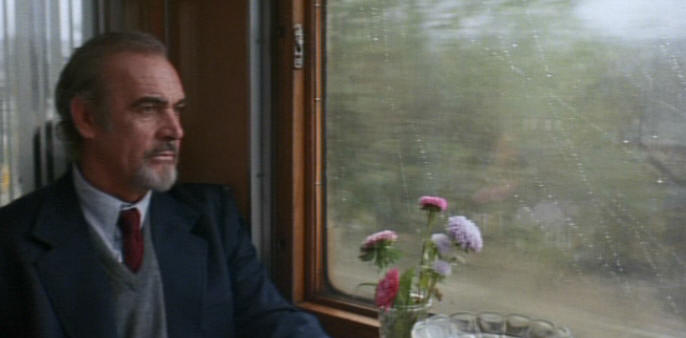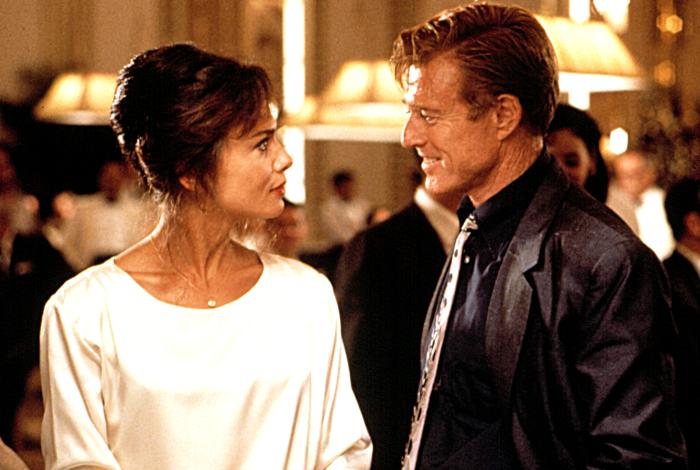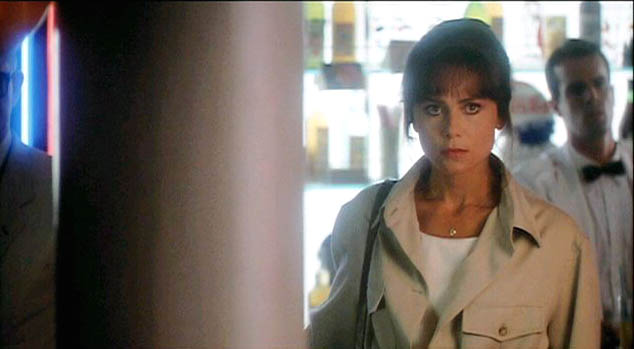From the Chicago Reader (December 14, 1990). Note: Twilight Time has recently released The Russia House on Blu-Ray. — J.R.
THE RUSSIA HOUSE
*** (A must-see)
Directed by Fred Schepisi
Written by Tom Stoppard
With Sean Connery, Michelle Pfeiffer, Roy Scheider, James Fox, John Mahoney, J.T. Walsh, Ken Russell, David Threlfall, and Klaus Maria Brandauer.
HAVANA
** (Worth seeing)
Directed by Sydney Pollack
Written by Judith Rascoe and David Rayfiel
With Robert Redford, Lena Olin, Alan Arkin, Tomas Milian, Raul Julia, Richard Farnsworth, Mark Rydell, Daniel Davis, and Tony Plana.
The Russia House and Havana are both lavishly mounted love stories, packed with action and developed in relation to political intrigues abroad. What’s surprising about both is that although they’re Hollywood movies to the core, the American characters aren’t exactly the good guys.
In The Russia House the only important American characters are villains, while the hero is British and the heroine Russian. In Havana the hero is as American as they come, and he certainly behaves heroically, yet the film as a whole raises doubts about whether he has missed the boat, historically speaking. We entertain fewer doubts in this respect about the heroine, a Swede with an American passport who’s married to a Cuban.
Both pictures follow a romantic scenario that can be traced back to Casablanca (a lineage especially apparent in Havana); a cynical, doggedly apolitical adventurer- hero is goaded into action through his love for a politically committed woman. In The Russia House, as in Casablanca, the hero’s transformation is total; in Havana the transformation proves to be temporary and makeshift.
E.M. Forster once remarked that if he had to choose between betraying his friend and betraying his country, he hoped that he had the guts to betray his country. Change “friend” into “lover” and you have a rough idea of the dilemma faced by the heroes in both of these movies, which aspire to be progressive political history lessons in the form of romantic love stories. One problem with using eros as a lever into politics, however, is the risk of abstracting and oversimplifying the political issues.
Ironically, though Havana is set on the eve of the Cuban revolution (Christmas 1958) and The Russia House is set in present-day Russia, Havana comes closer to reflecting contemporary American attitudes. One easy explanation for this is that Havana‘s director (Sydney Pollack) and screenwriters (Judith Rascoe and David Rayfiel) are all American, while The Russia House‘s director is Australian (Fred Schepisi) and its screenwriter is Czech-English (Tom Stoppard), adapting an English novel by John Le Carre.
Of all the Christmas releases I’ve seen so far, The Russia House is the only one I look forward to seeing a second time. I haven’t yet had a chance to read Le Carre’s novel — first published in 1988 and, significantly, already available in Russian translation — though I’ve dipped into it enough to determine that the plot has been reshaped for the film in at least a couple of important ways: the novel’s narrator, a former legal adviser known as Harry who now works for British intelligence, doesn’t figure in the movie at all, at least not with the same name or narrative function, and the ending has been sweetened Hollywood-style. But Le Carre’s jaundiced view of spying, which I know from other novels, is still very much present in the movie. And I tend to agree with Thomas Pynchon’s remark about Le Carre that he “has upped the ante for the whole genre” of spy fiction and novels of intrigue — largely, I think, because of the feeling for moral nuance that he brings to the subject of cold-war espionage. (One might add that an acute feeling for moral nuance is largely what links Schepisi’s rather disparate films, including The Chant of Jimmie Blacksmith, Barbarosa, Roxanne, and A Cry in the Dark.)
Barley Blair (Sean Connery), an eccentric British publisher with a taste for booze who plays jazz saxophone in his spare time, is slipped a manuscript that contains a great deal of information about Soviet defense by a Soviet scientist who calls himself Dante (Klaus Maria Brandauer). In the interests of peace, Dante wants the book published in the West and uses his former mistress, a beautiful Soviet woman named Katya (Michelle Pfeiffer), as an emissary. In no time at all, a group of CIA and British-intelligence operatives have persuaded Barley to turn amateur spy in his meetings with Katya and Dante, secretly taping all his conversations with them, to help U.S. and British intelligence amass more information about the manuscript and its implications. The setting is postglasnost Russia, but glasnost or no glasnost, these dogged operatives — referred to as “gray men” — feel they have to justify their dubious jobs and existence by continuing the dirty business of spying. Barley reluctantly goes along with them, until he starts falling in love with Katya and begins to question the wisdom of what he’s doing. “What Is This Thing Called Love?” is the principal tune he’s shown playing on the soprano sax — roughly in the style of Sidney Bechet (dubbed by Branford Marsalis) — and the song seems to express not only his romantic yearnings but a more general reflection, inspired by Katya, on how little the personal can be separated from the political.
I’m not entirely sure I buy the initial premise that a character like Barley would agree to go along with the spy charade, although the movie devotes a lot of time to trying to show us how he gradually gets sucked in, and Connery’s charismatic performance certainly helps. (After all, it’s the business of stars like him to help us believe in imponderables.) If we accept this premise, however, the remainder of the film proceeds logically and persuasively.
Pfeiffer does a remarkable job of impersonating a Russian woman. Equally adept are the various intelligence operatives (including Roy Scheider, James Fox, John Mahoney, and film director Ken Russell, making his first extended appearance as an actor). And Tom Stoppard, one of the ablest English playwrights around, has written literate and intelligent dialogue that bolsters the fine ensemble playing.
The film really comes into its own during the monitored encounters between Barley and Katya. Schepisi’s crosscutting between these conversations, most of which take place outdoors, and the responses of the operatives listening at their headquarters is unusually adroit — creating a montage pattern that is complicated further when parts of the conversations dovetail into flashbacks, and setting up a multilayered form of moral suspense that is used almost musically at the same time that it builds up a complex yet lucid sense of conflicted interests. Furthermore, because the movie uses actual Moscow and Leningrad exteriors throughout, handsomely framed in ‘Scope by cinematographer Ian Baker, there is more of a sense of everyday Russian life conveyed here — on the street, in the subway, in parks and other public places — than in any other Hollywood feature set in the Soviet Union that comes to mind.
Indeed, the sharp contrasts between the Russianness of the exterior settings and the bureaucratic anonymity of the spy headquarters are fundamental and vital to the movie’s concerns. “The gray men are taking over the human race” is a key line in the dialogue. The sentiment proves to be as central to the film’s meaning as Barley’s declaration to Katya after he decides he’s had enough of spying: “You are my only country now.”
One can almost imagine the same line being delivered by Jack Weil (Robert Redford) to Roberta Duran (Lena Olin) in Havana, although here the feeling for moral nuance is somewhat less developed. Jack, a professional poker player, finds himself playing cards on a ferry bound for Havana on the eve of the Cuban revolution. Generally he couldn’t care less about what’s going on, although after Roberta persuades him to smuggle her car into Cuba in exchange for cash and he discovers the car contains a shortwave radio, his curiosity is piqued. This curiosity proves to be more about her than the political struggle she’s involved in, but before long he discovers that those two interests aren’t quite as separable as he’d like to imagine.
I don’t have much of a problem accepting Jack as either a character or a narrative premise, particularly because he clearly derives from the prototype of Rick in Casablanca, a prototype that has been fairly serviceable ever since. But I do have a problem accepting Robert Redford as a replacement for Humphrey Bogart, and not only because he’s approximately a decade older (53) than Bogart was when he played in the earlier film. The fact that Redford is older should help rather than hurt the character, since the prototype’s cynicism is anchored in his weary sense of past experience. Even in his early 40s Bogart had the kind of face — with tortured eyes suggesting fires inside a crater — that reflected this sort of depth. But Redford has never suggested anything comparable, and there is reason to doubt that he ever will. The blandness of his good looks has always seemed to suggest more the denial of a past than the registering of experience, sour or otherwise. It would appear that he wound up in this part mainly because of his long-standing association with director and coproducer Sydney Pollack. (Their six previous collaborations are This Property Is Condemned, Jeremiah Johnson, The Way We Were, Three Days of the Condor, The Electric Horseman, and Out of Africa.)
I suppose one can rationalize this miscasting by pointing out that Jack is a shallower version of Rick, not only because he fails to make an equivalent leap of faith into political action but also because, deliberately or not, the filmmakers make him much more of a simpleton. In the coda to Havana, set in Key West in 1963, Jack reflects offscreen that “we’ve got our own revolution going [now].” The film is too unfocused to make clear whether this incongruous linkage of the Cuban revolution with U.S. dissidence is supposed to reflect the insight of a plain-thinking visionary or the conclusion of a lunkhead. (I’d opt for the latter, although I suspect that the filmmakers would situate him somewhere between these extremes.)
Although Roberta is much younger than Jack, she proves to have a much more paraphrasable and plausible past — and Lena Olin’s own considerable acting abilities are more than enough to flesh this out. In one scene she explains to Jack that she (like Olin) was born in Sweden, emigrated to the States, married a Hollywood screenwriter who was later blacklisted (which accounts for her U.S. passport), moved with him to Mexico, split up with him, and wound up in Cuba, where she married Arturo (Raul Julia), an upper-class Castro partisan. The fact that she has such a varied past is part of the movie’s overall liberal scenario, which dictates that all of the Americans in Havana in 1958 are sleazy or shallow — like the casino owner played adroitly by Alan Arkin, the cynical CIA operative who poses as a food critic, and assorted tourists and gangsters. The others are either callow Batista thugs, jaded Cuban gamblers and gangsters, or impassioned and complex freedom fighters and Castro sympathizers. Given my own political biases, I can easily accept this form of typecasting. But the problem with privileging Jack’s viewpoint of the events is that the Cuban revolution and its underpinnings are never really allowed to take center stage; they always seem to be taking place on the periphery.
Up to a point this narrative strategy allows the movie to milk a certain irony out of Jack’s noninvolvement, which is altered only by his romantic interest in Roberta. First he manages to bribe enough officials to get her out of jail; then, after she rejoins the revolutionaries in the south, he manages to find her and tries to persuade her to return with him to the U.S., arguing that the struggle she’s involved in isn’t really her own. The fact that she initially goes along with his scheme is necessary to the film’s romantic plot, but it tends to make hash of both her character and the nature of her political involvement — suggesting that the movie’s effort to work both sides of the street is ultimately a losing proposition.
But as long as Havana coasts along on spectacle, atmosphere, and glancing character details, it is entertaining and absorbing to watch. I can’t vouch for the accuracy of the portrayal of 1958 Havana (the film was shot in the Dominican Republic), but Pollack and his screenwriters certainly create a world with some internal consistency. In addition, the portraits of some of the ugly Americans linger in one’s memory a lot longer than Redford’s morose persona — especially Daniel Davis as a CIA agent, Mark Rydell as the gangster Meyer Lansky, and Richard Farnsworth as a grizzled gambler — despite the fact that the last two minor characters seem to appear out of nowhere.
When last seen, the CIA operative is about to leave for Indochina (hint, hint) and has observed philosophically to Jack, “It’s never over, so we never lose.” “You never win either,” Jack replies, summarizing the general thrust of The Russia House. What the line is doing in Havana, however, seems less certain, since winning or losing in political terms is an issue that’s rigorously avoided. In The Russia House the political and the personal gradually become indistinguishable; in Havana the political seems to triumph over the personal — but what’s won or lost in the process is anybody’s guess.

